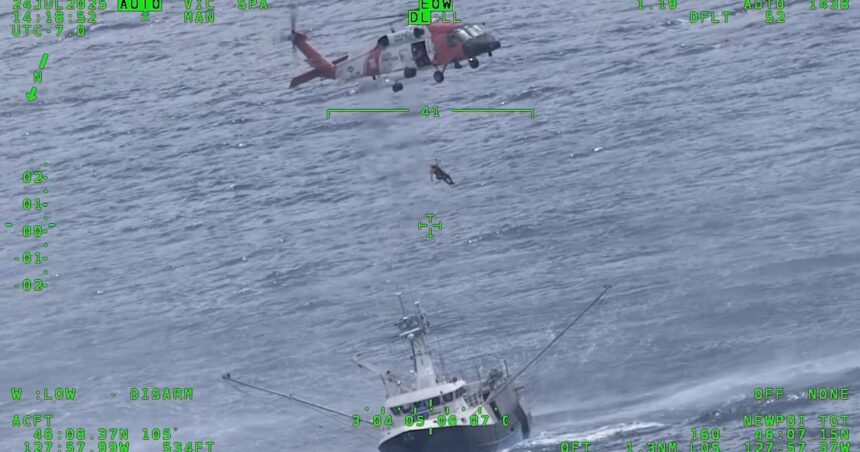A Canadian fishing vessel captain is recovering in hospital following a dramatic rescue operation off the Oregon coast early Thursday morning that involved both American and Canadian rescue teams.
Gordon MacPherson, 54, from Prince Rupert, British Columbia, was airlifted to safety after his 38-foot commercial fishing vessel “Northern Light” began taking on water approximately 85 nautical miles west of Newport, Oregon.
The U.S. Coast Guard received the distress call at 2:17 a.m. when MacPherson activated his emergency position-indicating radio beacon (EPIRB). Weather conditions at the time included 4-meter swells and winds exceeding 45 km/h, according to Lieutenant Commander Maya Rodriguez of the U.S. Coast Guard’s Pacific Northwest division.
“This rescue highlights the importance of proper safety equipment and international cooperation,” Rodriguez told me during a phone interview. “The captain did everything right—he had his EPIRB properly registered, was wearing his survival suit, and maintained radio contact as long as possible.”
The fishing vessel, which left Astoria, Oregon four days earlier, was reportedly returning from what local fishermen described as a productive halibut season. The Department of Fisheries and Oceans Canada confirmed MacPherson holds a valid commercial fishing license and has been operating along the Pacific coast for over 25 years.
“Gordon is one of our most experienced skippers,” said James Williams, president of the Prince Rupert Fishermen’s Cooperative. “The fact that he got into trouble shows just how unforgiving the ocean can be, even for veterans.”
The rescue operation involved a coordinated effort between American and Canadian authorities. A U.S. Coast Guard MH-60 Jayhawk helicopter from Air Station Astoria arrived on scene first, lowering a rescue swimmer who helped MacPherson into a basket before being hoisted to safety.
Canadian Armed Forces Maritime Rescue Coordinator Captain Sarah Johnston explained that while the incident occurred in U.S. waters, the Joint Rescue Coordination Centre in Victoria was immediately notified due to the vessel’s Canadian registry.
“This is a textbook example of our cross-border rescue protocols working effectively,” Johnston said. “When lives are at stake, international boundaries become secondary to the mission.”
Medical personnel at Oregon Coast Hospital report MacPherson is in stable condition, suffering from mild hypothermia and exhaustion. His family has arrived from British Columbia, according to hospital spokesperson Emily Chen.
The vessel itself could not be saved and sank shortly after the rescue. Initial reports suggest a hull breach may have been responsible for the emergency, though the Transportation Safety Board of Canada will conduct a full investigation in cooperation with the U.S. National Transportation Safety Board.
Statistics from the Canadian Coast Guard show that approximately 30 Canadian fishing vessels require emergency assistance in U.S. waters annually, with about half of those incidents occurring off the Oregon and Washington coasts. Last year’s federal budget allocated an additional $18 million to cross-border marine rescue operations, funds that Transport Canada says have enhanced response capabilities along the Pacific coast.
MacPherson’s wife, Heather, released a brief statement through the hospital: “We’re grateful beyond words to the brave men and women who saved Gordon’s life. Our family has been fishing these waters for three generations, and we understand the risks, but also the incredible community that looks out for one another at sea.”
Fellow fishermen in Prince Rupert have already begun organizing support for the MacPherson family. The local chapter of the Fishermen’s Benevolent Association has started a fundraising campaign to help offset expenses while MacPherson recovers.
“The fishing community is tight-knit,” explained Williams. “When one of us faces hardship, we all step up. Gordon would do the same for any one of us.”
Oregon Senator Maria Sanchez highlighted the rescue as an example of the strong relationship between the U.S. and Canada. “Our shared waters require shared responsibility,” she noted in a statement. “I’m proud of our Coast Guard’s swift response and ongoing cooperation with our Canadian partners.”
As MacPherson recovers, the incident serves as a reminder of the dangers faced by commercial fishermen and the vital importance of emergency preparedness at sea. According to WorkSafeBC, commercial fishing remains one of the most dangerous occupations in Canada, with an injury rate nearly three times the provincial average.
For now, the MacPherson family is focused on recovery, with Gordon expected to return to British Columbia next week. As for whether he’ll return to the sea, his wife Heather simply said, “First things first. But fishermen don’t stay on land for long.”






